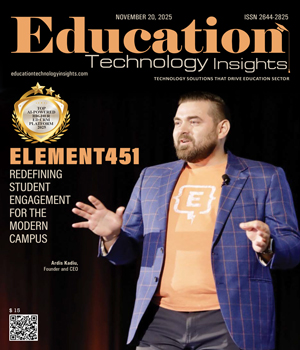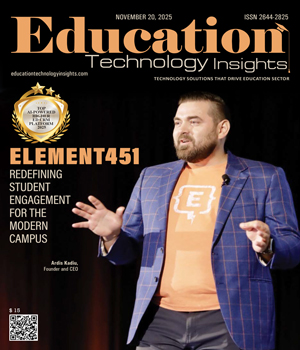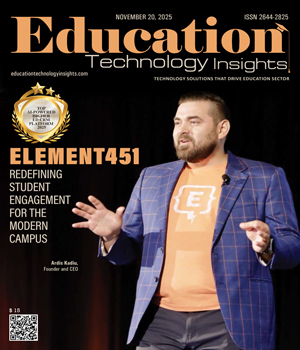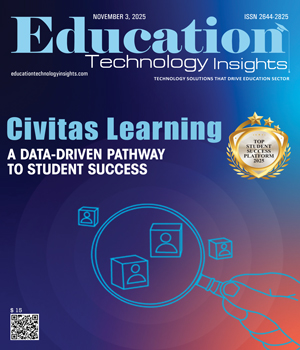THANK YOU FOR SUBSCRIBING
Be first to read the latest tech news, Industry Leader's Insights, and CIO interviews of medium and large enterprises exclusively from Education Technology Insights
Faculty Development in the AI Era: Empowerment over Fear Moving From AI Resistance to Responsible Innovation in Higher Education Classrooms
Shannon Fuhrman, Senior Director of Training & Development, Regent University
 Shannon Fuhrman, Senior Director of Training & Development, Regent University
Shannon Fuhrman, Senior Director of Training & Development, Regent UniversityArtificial Intelligence is a topic dominating the higher education landscape. For faculty, the era of AI has been met with mixed reception— curiosity for some, resistance for many, and fear for others. Playing into this fear and sense of the unknown, many faculty have voiced concern over the sense of power AI has introduced in academic settings. But with power often comes a sense of permanency, and AI is just getting started. A new era of curriculum development, student engagement, and academic culture is beginning to take shape. So if there’s no avoiding AI, how can institutions help faculty shift from fear to flourishing in the AI age? Let’s start by acknowledging the core concerns faculty are expressing around artificial intelligence adoption in collegiate settings.
The Current Reality: Tech Overload, Burnout, and Mistrust
Imagine being presented with endless new tools—each promising lighter course loads, less time grading, and stronger student writing—but with no time to learn how to use them. For faculty already managing full course loads, trying to adopt new instructional strategies without the right training, support, or security is a recipe for burnout. In many cases, it leads to tech overload and growing mistrust—effectively pinning faculty against their institutions.
To make matters worse, much of the professional development offered in higher education is still compliancedriven, focused on checking boxes and using the “next tool” to boost retention goals. While this approach isn’t inherently bad, it’s not transformative either. If the academic culture surrounding innovation is changing, then our models for faculty development must evolve with it.
Let’s take a closer look at what that future could—and should—look like.
A Better Way: Coaching-Centered, Human Focused Development
Effective faculty development in the era of AI centers around three essential pillars: curiosity before competence, feedback and reflection, and psychological safety. When it comes to curiosity before competence, faculty need space to explore AI tools without the pressure to master them immediately or meet looming deadlines. Giving them room to “play”—to test the boundaries of AI use both inside and outside the classroom— opens the door to real innovation. In practice, that might look like peer demonstrations, one-on-one training sessions, or FAQ-style workshops that lower the barrier to entry and build confidence.
“Adopting technology in higher education isn’t about chasing every new trend—it’s about helping people thrive through change”
Once that exploration begins, institutions should encourage faculty to share their experiences—not just successes or datadriven outcomes, but the messy parts too. Leveraging coaching models in peer settings and embedding reflective practice helps normalize growth and reduce the anxiety that often comes with change. Tools like the SBI (Situation, Behavior, Impact) model or feedforward strategies invite constructive dialogue while reducing defensiveness and emphasizing practical takeaways. Centering these conversations in a reflective framework can lead to more positive engagement and far less fear.
But perhaps the most important element of all is psychological safety. Faculty need to feel safe admitting, “I don’t know how to use this yet.” And that safety starts at the top. When leaders model vulnerability—acknowledging they don’t have all the answers and opening space for real dialogue— faculty feel more empowered to experiment without fear of judgment. After all, being an expert in one’s field doesn’t mean you can’t still be a learner.
At Regent, we’re embracing AI adoption through faculty development in an open forum setting. Our team of subject matter experts (SMEs) formed an AI Taskforce made up of individuals passionate about exploring how AI is shaping the higher education landscape. This group hosts monthly openfloor discussions and presentations where faculty and staff are encouraged to ask questions, share observations, and reflect on how AI is influencing their work.
These forums foster honest dialogue, peer feedback, and collaborative reflection—creating space for faculty to think deeply about how AI is impacting both students and the university at large.
More specifically, my team—embedded within the Enrollment Management division—created a specialized group focused on how we can integrate AI into training for staff, faculty, and students. Our goal is to enhance learning models across coaching, professional development, and student engagement by treating AI as a catalyst for creative thinking, not a replacement for it.
As we navigate the era of AI in faculty development, our focus should be clear: empower, don’t intimidate. From a leadership perspective, adopting technology in higher education isn’t about chasing every new trend—it’s about helping people thrive through change.
In professional development, we must emphasize that AI is not a threat to teaching or career longevity—it’s a partner in designing innovative, student-centered learning experiences. Let’s create spaces where AI can be discussed openly and thoughtfully—for the sake of our classrooms, our institutions, and most importantly, for our faculty.
Read Also
Empowering Educators through Purposeful, Connected and Transformative Learning
Empowering Students to Lead: A New Vision for Civic Learning
The Director's Playbook: Strategic Digital Transformation in Rual Hyper-Growth Districts
The Art and Architecture of Student Support
From At-Risk to At-Promise: The Language Revolution Higher Education Needs
Teaching Tomorrow: How Western Governors University Is Redefining Teacher Preparation

I agree We use cookies on this website to enhance your user experience. By clicking any link on this page you are giving your consent for us to set cookies. More info
























